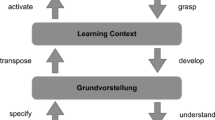Abstract
The aim of this chapter is to stress the role of GeoGebra as a methodological resource. In particular, we contend that teachers need to become aware that a appropriate integration of GeoGebra within the classroom activities could foster the construction of mathematical knowledge. As a consequence, educators need to guide teachers to perceive GeoGebra as a methodological resource so that they would be able to effectively use it. As a theoretical framework we mainly refer to the “instrumental approach” and to the idea of “mathematics laboratory as a Renaissance workshop”.
Access this chapter
Tax calculation will be finalised at checkout
Purchases are for personal use only
Preview
Unable to display preview. Download preview PDF.
Similar content being viewed by others
REFERENCES
Bottino, R.M. (2000). Advanced Learning Environments: Changed views and future perspectives, in M.Ortega & J. Bravo (Eds.), Computers and Education: towards an interconnected society, The Netherlands, Dordrecht: Kluwer Academic Publishers, 11–27.
Borba, M. & Villarreal, M. (2005) Humans-with-media and the Reorganization of Mathematical Thinking: information and communication technologies, modeling, experimentation and visualization. Mathematics Education Library, 39, Springer Science+business Media.
Faggiano, E. (2009). Leading teachers to perceive and use technologies as resources for the construction of mathematical meanings, Proceedings of CERME 6, WG7 - Technologies and resources in mathematical education, 1310–1319.
Hölzl, R. (2001). Using dynamic geometry software to add constrast to geometric situations – A case study. International Journal of Computers for Mathematical Learning, 6(1), 63–86.
Laborde, C. (2002). Integration of Technology in the Design of Geometry tasks with Cabri-Geometry, International Journal of Computers for Mathematical Learning 6(3), 283–317.
Lagrange J.B., Artigue M., Laborde C., & Trouche L. (2003). Technology and Mathematics Education, in A. Bishop et al., (Eds.), Second International Handbook of Mathematics Education: Part two, 237–269.
Mously J., Lambidin D. and Koc Y. (2003). Mathematics Teacher Education and Technology, in A. Bishop et al., (Eds.), Second International Handbook of Mathematics Education: Part two, Dordrecht: Kluwer, 395–432.
Noss, R., & Hoyles, C. (1996). Windows on Mathematical Meanings: Learning Cultures and Computers, Dordrecht: Kluwer.
Trouche, L. (2000). La parabole du gaucher et de la casserole à bec verseur: Étude des processus d’apprentissage dans un environnement de calculatrices symboliques, Educational Studies in Mathematics 41, 239–264.
Trouche, L. (2003). From artifact to instrument: mathematics teaching mediated by symbolic calculators, Interacting with computers, 15(6) 783–800.
UMI-CIIM (2004). New mathematical standards for the school from 5 through 18 years, Ed. Anichini G., Arzarello F., Ciarrapico L., Robutti O.
Vérillon, P. & Rabardel, P. (1995). Cognition and artifacts: a contribution to the study of thought in relation to instrumented activity. European Journal of Psychology of Education, 10(1), 77–101.
Author information
Authors and Affiliations
Editor information
Editors and Affiliations
Rights and permissions
Copyright information
© 2011 Sense Publishers
About this chapter
Cite this chapter
Faggiano, E., Ronchi, P. (2011). Geogebra as a Methodological Resource. In: Bu, L., Schoen, R. (eds) Model-Centered Learning. Modeling and Simulations for Learning and Instruction, vol 6. SensePublishers. https://doi.org/10.1007/978-94-6091-618-2_13
Download citation
DOI: https://doi.org/10.1007/978-94-6091-618-2_13
Publisher Name: SensePublishers
Online ISBN: 978-94-6091-618-2
eBook Packages: Humanities, Social Sciences and LawEducation (R0)





